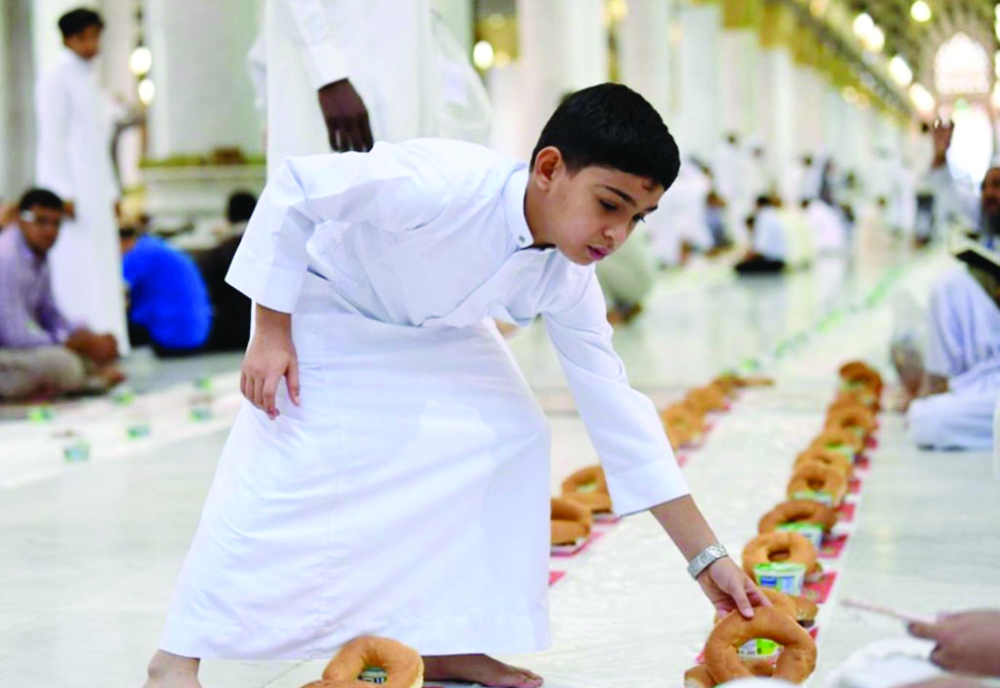JEDDAH: After two years of COVID-19 restrictions, the two holy mosques in Makkah and Madinah will again allow customary communal Ramadan rituals including itikaf or secluded devotion, and iftar suppers — a return to normalcy welcomed by citizens and residents.
The decision was announced on March 22 by Sheikh Abdulrahman Al-Sudais, head of the General Presidency for the Affairs of the Two Holy Mosques, on Twitter @ReasahAlharmain: “We are glad to announce the return of Itikaf in Haramain (two sanctuaries). It will be applied according to specific criteria, and permits will be available through the official website of the presidency soon.”
Itikaf takes place over the last 10 days of Ramadan when worshippers go into seclusion and devote their time to prayer and reading the Qur’an. It starts from the sunset of the 20th day of Ramadan and ends when the Eid moon is sighted. In itikaf, worshipers live and sleep in the mosques and only leave for ablutions.
HIGHLIGHTS
• For some Saudi families, providing iftar meals at the same spot in the precincts of the mosques, have been passed down through the generations.
• The distribution of iftar meals was allowed last year in Ramadan but this year on Jan. 13, Sheikh Abdulrahman Al-Sudais announced the return of communal iftar sufras at the two mosques.
• Those families, who received their permits, said that they start preparing for iftar two weeks prior to Ramadan, which is part of the enjoyment.
Layla Nagadi, a 59-year-old Jeddah resident, has been observing itikaf for over 15 years. “Nothing equals itikaf in Makkah, where you can dedicate the last 10 days of Ramadan for worship only.”
“I was very happy when Al-Sudais announced the return of itikaf this year, I will be among the first people to apply.”
Before COVID-19, worshipers were welcomed at the two holy mosques for iftar by philanthropists who provide iftar sufras or meals at specific locations. The distribution of iftar meals was allowed last year in Ramadan but this year on Jan. 13, Al-Sudais announced the return of communal iftar sufras at the two mosques.
Two thousand permits have been issued to those interested in this form of charity. For some Saudi families, providing iftar meals at the same spot in the precincts of the mosques, have been passed down through the generations.
Shatha Jaylan, 30, from Madinah, told Arab News that she and her family have provided iftar for years near the Al-Rawda door. “We have been serving iftar meals in (the) Madinah haram for nine years in the ladies’ section. It is a collaboration between my father and my aunty as they both really appreciate the spirituality of (the) haram during the holy month of Ramadan.”
Those families, who received their permits, said that they start preparing for iftar two weeks prior to Ramadan, which is part of the enjoyment. “We provide yoghurt, shouraik bread, duggah (Madini mixture of condiments), different types of dates such as rutab and sukkary, Zamzam water bottles, Saudi coffee, and tea.”
“I (personally) used to serve iftar for visitors for three years in a row every Ramadan season; we used to prepare everything in the morning so we could bring (it all to the) haram by Asr prayer to avoid the peak hour,” Jaylan said. “It is really important to get everything set up so visitors can enjoy their meals.”
Jaylan said that like other people providing meals, she also hires workers to help with the preparation and serving, usually unemployed people seeking work. However, this year Jaylan said her family would not organize any meals so that others could be given a chance to do so.
“Once we heard the announcement of the return of iftar meals we were extremely happy, however, we did not renew our membership this year as there were new rules and regulations that were a bit different,” she said. “Providing iftar, gaining hasanat, going to (the) haram every day might sound nice and fun, but it is a huge responsibility.”
“My aunt, cousins, and I used to stay in (the) haram from (the) afternoon till (the) evening every day for one month. It is not easy as once the visitors leave, we (had) to collect the plastic mats, leftovers, and disposable utensils. It is a big effort, but one honest dua from visitors wipes all the tiredness away,” she added.
Meanwhile, the general presidency is set to launch several programs to provide services for worshipers during Ramadan. Over 12,000 workers will be serving in Makkah’s grand mosque, with the third expansion used at full capacity.
Crowd control measures have been instituted, with prayer areas designated for people with disabilities and the elderly.






























